#i think complicity is often conflated with...how to say...friendliness ?
Explore tagged Tumblr posts
Note
I just finished reading The Mirror and the Light, and wanted to know your opinion on the dynamic portrayed between Cromwell and Wyatt. Why do you think it was written in the way it was? It seemed like he didn't blame him at all for Anne's death.
Mm, I mean...cynically, that was a cynical approach (the only person the text even suggests, that seems to believe Anne's death wasn't deserved, was Cranmer). I don't think it's made explicit, really.
Beyond the evidence of their professional relationship, it's likely that the Spanish Chronicle was the inspiration (selective...inspiration...since the report from the same source that Cromwell tortured Smeaton is rather derisively dismissed):
Amongst all these gentlemen he noticed Master Wyatt, the gentleman who had been imprisoned for the affair of Queen Anne ; and he called him, and said, "Oh, gentle Wyatt, good-bye, and pray to God for me." There was always great friendship between these two, and Wyatt could not answer him for tears.
#anon#the spanish chronicle#there is the letter from wyatt's father to cromwell thanking him; of course#but that doesn't necessarily mean that wyatt's personal feelings towards cromwell were...warm.#or vice versa#yes he was released; but so was francis bryan; and i don't think bryan's personal feelings towards cromwell were necessarily warm either#particularly in regards to the downfall of his friends in the exeter conspiracy#i think complicity is often conflated with...how to say...friendliness ?#like geoffrey pole was complicit also. i don't think this meant that he regarded cromwell warmly .#it means they made the calculation that to cooperate with a person of great influence and power was in their own best self interest#no more and no less
4 notes
·
View notes
Note
I saw one tumblr user post how Spider-Man in the comics actually had no empathy or compassion, that he does what he does solely out of guilt and though he isn’t cruel, he isn’t kind either. I understand that Peter can be crude and when driven to a point he can get seriously violent, but is that statement completely accurate?
Name names, anon, I want the gossip.
Okay, but no, seriously, without having seen that post and so with no greater context for these statements, I think to say that Peter in the comics (by which I’m assuming we’re talking about 616 continuity) has no empathy or compassion and that he operates solely out of guilt is an extremely narrow reading of the character. While guilt can be one of Peter’s motivators, I would say that compassion is an equally strong, if not stronger force within him. I think that guilt is what kicks off a lot of Peter’s motivation to help other people as Spider-Man, but what begins as guilt evolves into a greater sense of responsibility as Peter grows as a character -- it’s not like he has one point of character development when the robber shoots Uncle Ben and then that’s it forever. One of the reasons Peter is such a great character is that you genuinely can trace his development throughout the comics, and I think to say that Peter is solely motivated by guilt is a very pessimistic way of looking at Spider-Man, to view all of the character’s actions as stemming only from his guilt about Uncle Ben and not because he has the power -- and therefore the responsibility -- to help others. I would even go so far as to say it’s an intentionally negative and pessimistic way to look at the character.
I think in the past I’ve made posts saying that while Peter isn’t always nice, he’s a deeply kind character, with the intention to highlight the difference between someone being “nice” and someone being “kind.” To be nice is to be pleasant and agreeable, to be kind is to be loving and good-hearted. There’s a fairly big gap between these definitions, even if they’re conflated a lot of the time. To be “nice” may not actually be a positive trait for a character, depending on the situation, but to be kind always is. And to say that Peter isn’t kind or compassionate is deeply mystifying to me when I would identify an incredibly deep -- and learned -- kindness and compassion as some of his most primary character traits:
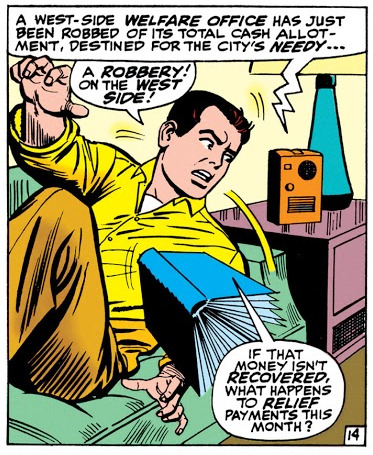
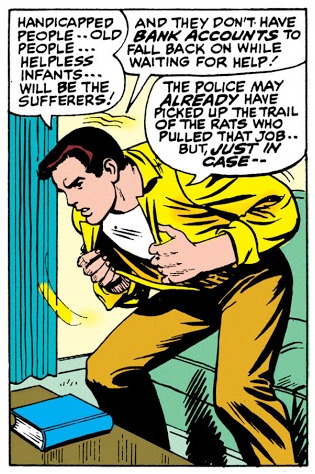
(ASM #50)

(Spectacular Spider-Man #213 -- look this one backfires on him significantly but it’s hard to argue his intention wasn’t compassionate.)
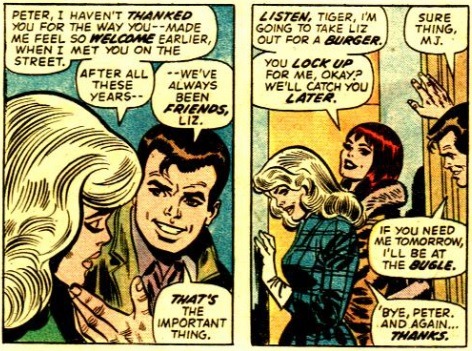
(ASM #133)
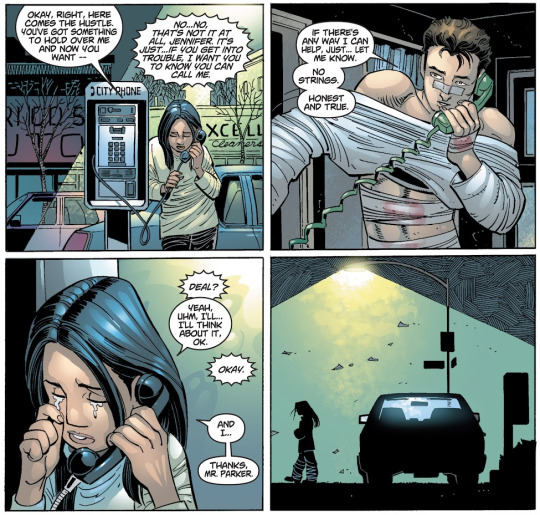
(ASM v2 #37) JMS’ run -- starting at ASM v2 #30 -- is I think especially adept at highlighting the depths of Peter’s kindness, focusing significantly on Peter’s relationships with his students when he begins teaching at his old high school.
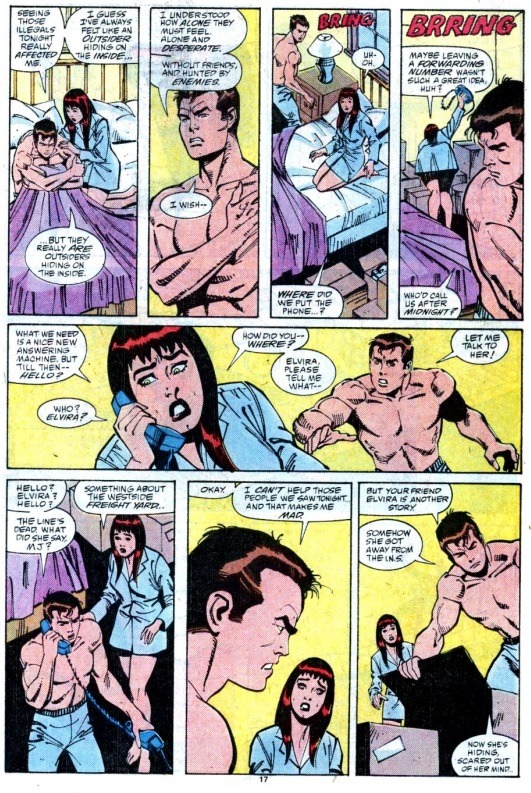
“Seeing all those illegals today really affected me.” + His empathy for both the situation illegal immigrants face and his immediate jump into action for Elvira, who isn’t someone he personally knows -- she’s his wife’s makeup artist. (Spectacular Spider-Man #138)
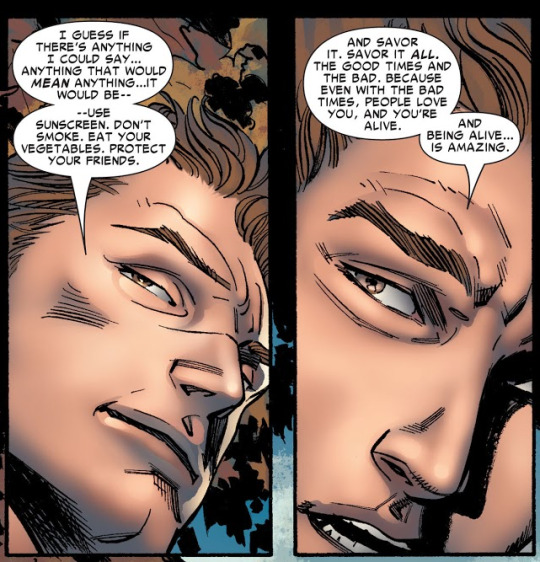
(ASM #536) “Use sunscreen. Don’t smoke. Eat your vegetables. Protect your friends.”
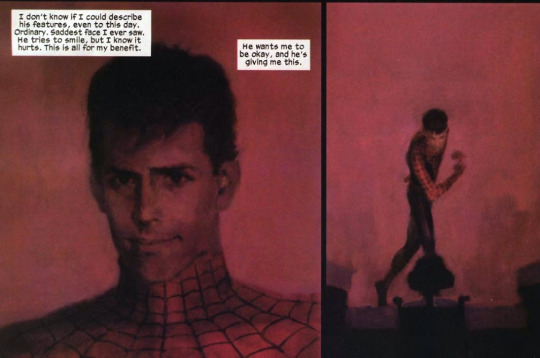
“He tries to smile, but I know it hurts. This is all for my benefit. He wants me to be okay, and he’s giving me this.” (Spectacular Spider-Man v2 #14)
It’s clear that a lot of Peter’s actions as Spider-Man stem from a place of caring, not out of misplaced guilt. Even I would say a lot of Peter’s more violent encounters are ultimately an extension of that caring -- his encounter with Sin Eater comes from his anger over Jean DeWolff’s death and the danger Betty Brant was placed in. When he lures Ero to her death in Friendly Neighborhood Spider-Man, he does it because she hurt Flash; similarly, he doesn’t truly lose it with Shathra until her machinations hurt Mary Jane. A lot of his early anger towards Doc Ock comes from Otto attempting to manipulate or otherwise involve May, and I think it’s fair to say that if it weren’t for Norman Osborn’s continued cruelty and harm towards his loved ones then the Green Goblin wouldn’t hold the center of power he does in Peter’s own consideration of his villains. And this trend doesn’t only apply to people in Peter’s personal circle -- he avenges the murder (or what he thinks is the murder) of a young boy by manipulating his killer into ripping off his own skin in Spectacular Spider-Man #128 and is violently driven over the edge of reason by the death of a woman he didn’t know in Spectacular Spider-Man #123.
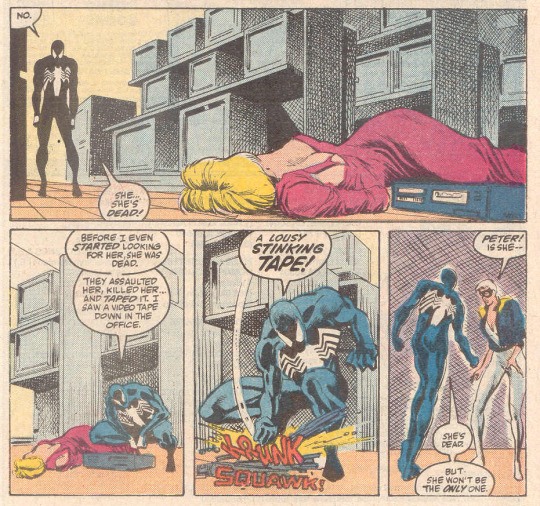
These aren’t nice actions -- I might even argue that some of them are cruel. But the place they originate from is a deep well of caring, and not a lack of it. If he had no empathy or compassion, he simply wouldn’t care, but the thing with Peter Parker as a character is never that he doesn’t care and often that he might care too much. The dial on every emotion is turned up to 11 and the knob is broken off. At the end of the day I think the “Spider-Man is relatable and that’s his foremost trait” train has done more harm to the character than good, and that the character at his best is a complicated one, with a lot of positive and negative character traits, and that as a character he might not be for everyone -- which I would argue is the point of characters, and that if one single character was supposed to be relatable to every person on the planet we wouldn’t have so many characters. But to argue that Peter Parker actually isn’t kind, that he’s not compassionate, is a flat out wrong reading of the character.
#peter parker#spiderman#marvel comics#traincat talks comics#*replies#long post/#spider-man only operates out of guilt over uncle ben is just an argument that does not hold up in the text!!
134 notes
·
View notes
Photo
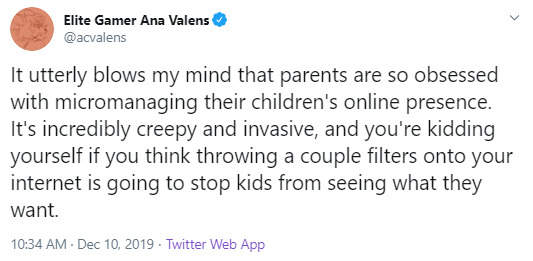
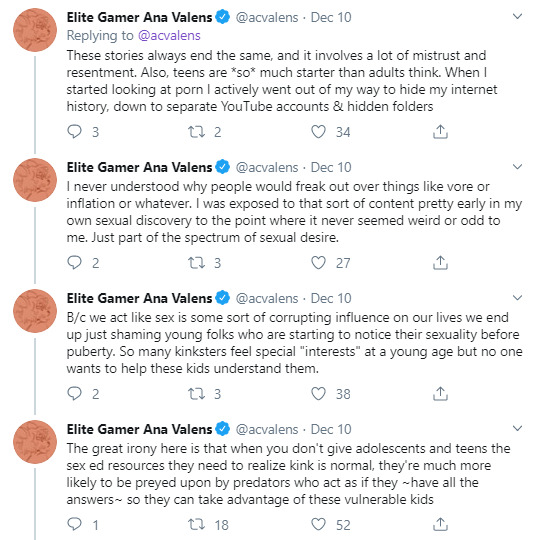
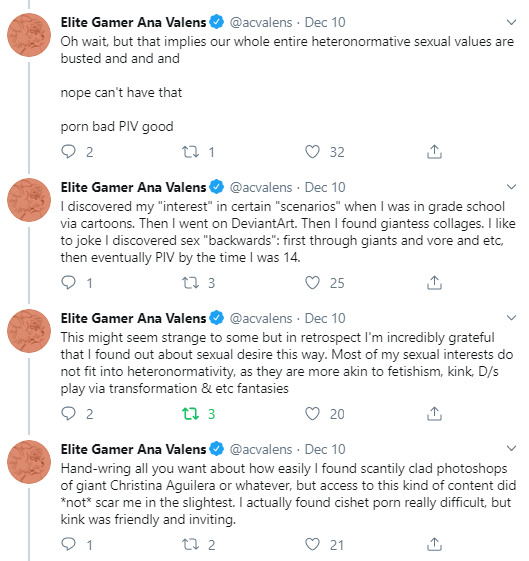
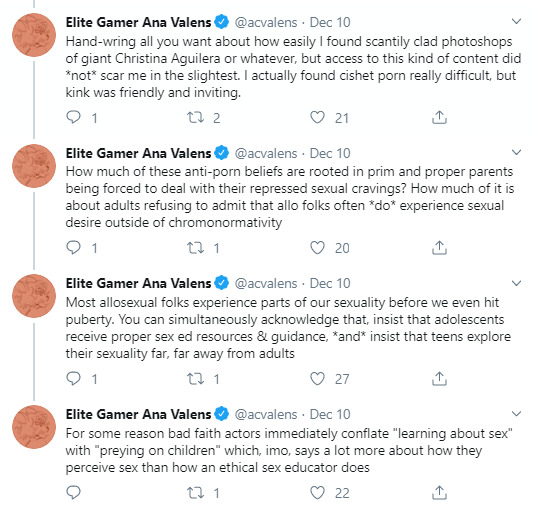
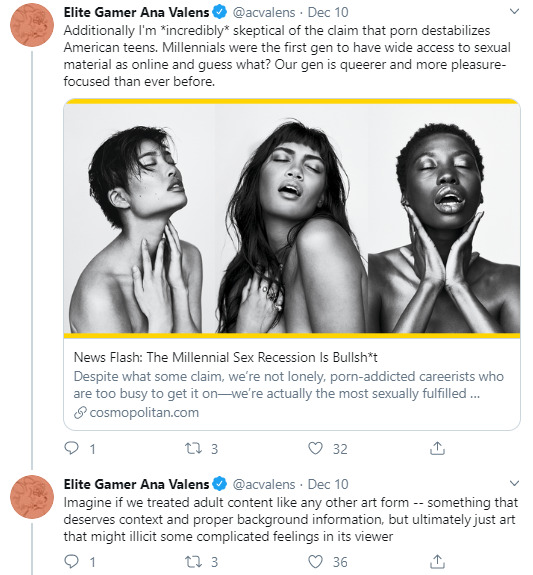
[image description below:
a series of tweets by Elite Gamer Ana Valens @acvalens that read
It utterly blows my mind that parents are so obsessed with micromanaging their children's online presence. It's incredibly creepy and invasive, and you're kidding yourself if you think throwing a couple filters onto your internet is going to stop kids from seeing what they want.
These stories always end the same, and it involves a lot of mistrust and resentment. Also, teens are *so* much starter than adults think. When I started looking at porn I actively went out of my way to hide my internet history, down to separate YouTube accounts & hidden folders
I never understood why people would freak out over things like vore or inflation or whatever. I was exposed to that sort of content pretty early in my own sexual discovery to the point where it never seemed weird or odd to me. Just part of the spectrum of sexual desire.
B/c we act like sex is some sort of corrupting influence on our lives we end up just shaming young folks who are starting to notice their sexuality before puberty. So many kinksters feel special "interests" at a young age but no one wants to help these kids understand them.
The great irony here is that when you don't give adolescents and teens the sex ed resources they need to realize kink is normal, they're much more likely to be preyed upon by predators who act as if they ~have all the answers~ so they can take advantage of these vulnerable kids
Additionally I'm *incredibly* skeptical of the claim that porn destabilizes American teens. Millennials were the first gen to have wide access to sexual material as online and guess what? Our gen is queerer and more pleasure-focused than ever before.
linked article - newsflash: the millenial sex recession is bullshit
Imagine if we treated adult content like any other art form -- something that deserves context and proper background information, but ultimately just art that might illicit some complicated feelings in its viewer
Oh wait, but that implies our whole entire heteronormative sexual values are busted and and and nope can't have that porn bad PIV good
I discovered my "interest" in certain "scenarios" when I was in grade school via cartoons. Then I went on DeviantArt. Then I found giantess collages. I like to joke I discovered sex "backwards": first through giants and vore and etc, then eventually PIV by the time I was 14.
This might seem strange to some but in retrospect I'm incredibly grateful that I found out about sexual desire this way. Most of my sexual interests do not fit into heteronormativity, as they are more akin to fetishism, kink, D/s play via transformation & etc fantasies
Hand-wring all you want about how easily I found scantily clad photoshops of giant Christina Aguilera or whatever, but access to this kind of content did *not* scar me in the slightest. I actually found cishet porn really difficult, but kink was friendly and inviting.
How much of these anti-porn beliefs are rooted in prim and proper parents being forced to deal with their repressed sexual cravings? How much of it is about adults refusing to admit that allo folks often *do* experience sexual desire outside of chromonormativity
Most allosexual folks experience parts of our sexuality before we even hit puberty. You can simultaneously acknowledge that, insist that adolescents receive proper sex ed resources & guidance, *and* insist that teens explore their sexuality far, far away from adults
For some reason bad faith actors immediately conflate "learning about sex" with "preying on children" which, imo, says a lot more about how they perceive sex than how an ethical sex educator does
end image description]
tweet source here
184 notes
·
View notes
Text
willy wonka and the inventor mindset
roald dahl’s books, as fondly as i feel about them, have a habit of conflating good and evil with being good or bad at appreciating aesthetic things—just a bit too much.* what i like about charlie and the chocolate factory, but even more so about willy wonka and the chocolate factory (the 1971 movie adaptation) is that it gets much more specific about what exactly it thinks aesthetic appreciation does and doesn’t look like. so you have wonka, who is a kind of “perfect” creator. and you have charlie, who is a “perfect” consumer. and then you have this whole cast of characters that get taxonomized by their ability to appreciate wonka’s inventions.
*(matilda in matilda and charlie in charlie and the chocolate factory are both good-hearted children, mistreated and deprived by a world of tv-watching, cake-gorging philistines. the foxes in the fantastic mr. fox are starved by evil farmers, so they steal chicken and ham to have an enormous banquet. the big friendly giant in the bfg is tragically forced to subsist on the awful snozzcumber, but gets triumphantly served a delicious breakfast at the end. hell, james lives in a giant peach. we know the witches in the witches are evil because they do perverse things to food, eating pea soup and plotting to lace the candies in sweet shops with poison. the villains in his stories are, without fail, the greedy, small-minded and gluttonous. sensitive appreciators versus abusive authority.)
the “bad” young people, for example, consume unthinkingly, with the entitlement of never having been denied anything. the “bad” middle generation is too preoccupied with image and success to care about appreciation (the overworked parents). and the oldest generation is complacent and isolated (the bedbound grandparents). by contrast, the “good” young person (charlie) savors his chocolate. the “good” middle person, wonka, is a workaholic in the service of something beautiful. and the “good” older person, joe, has a flexible mind still capable of childlike wonder. (all present-day jokes about what a jackass joe actually is aside)
in willy wonka the people who are bad at art constantly attempt to prove their expertise, except their boasting only reveals how much they care about the wrong or trivial things. their motivations are egoistic. so on the surface, someone like violet “loves” gum, is always talking about the properties of gum—flavor, how long it lasts—but what she really wants is to be the authority of gum. when wonka tries to warn violet away from his experimental gum, she declares: “so long as it’s gum, then that’s for me.” and proceeds to authoritatively narrate her own transformation into a human blueberry.
some more ways that ego interferes with appreciation:
1. confident wrongness
WONKA: Now, don't get overexcited! Don't lose your head, Augustus! We wouldn't want anyone to lose that! Yet. Now, the combination . . . This is a musical lock. (He plays the opening to Mozart's "Marriage of Figaro.")
MRS. TEEVEE (decisively): Rachmaninoff.
2. irrelevant boasting
WONKA: My dear Veruca, what a pleasure. And how pretty you look in that lovely mink coat.
VERUCA: I've got three others at home.
3. cruelty or evasion in order to preserve authority
MR. TURKENTINE: What do you think [this chemical mixture] makes?
CHARLIE: I don't know, sir.
MR. TURKENTINE: Of course you don't know. You don't know because only I know. If you knew and I didn't know, then you'd be teaching me instead of me teaching you. And for a student to teach his teacher is presumptuous and rude. Do I make myself clear?
CHARLIE: Yes, sir.
4. treating the unknown as “weird” or “disgusting” or trivial
MIKE: Boy, what weird looking coat hangers.
_
MR. SALT: What is this, Wonka? Some kind of fun house?
_
MRS. GLOOP: What a disgusting, dirty river.
MR. SALT: It's industrial waste, that. You've ruined your watershed, Wonka. It's polluted.
WONKA: It's chocolate.
VERUCA: That's chocolate?!?
CHARLIE: That's chocolate.
VIOLET: A chocolate river.
GRANDPA JOE: That's the most fantastic thing I've ever seen.
what’s peculiar about willy wonka is that superficially, wonka himself is quite egoistic. he’s obscure, and glib, and his teasing would be nearly cruel if the people were capable of detecting that he was teasing. this is a very different quality for a “good” authority figure in a dahl story to have. wonka does not have the motherly kindness of miss honey or the grandmother in the witches. i would call the book wonka impish, but the movie one is downright trollish. i’m not even sure if dahl would endorse him.
compare this wonka exchange with the one charlie had with his chemistry teacher:
WONKA: (as he mixes a concoction) Invention, my dear friends, is ninety-three percent perspiration, . . . six percent electricity, . . . four percent evaporation, . . . and two percent butterscotch ripple.
(He tastes.)
MRS. TEEVEE: That's a hundred and five percent!
MR. SALT: Any good?
wonka is being undeniably evasive. he doesn’t expect the people to understand his process, and so he doesn’t share it. he doesn’t even bother to have patience. but unlike the chemistry teacher’s evasion, which is a wall that you can breach with flattery or obedience (ego things), wonka’s acts as a kind of filter. the right person will notice that wonka’s flippancy is the real explanation of his invention process. he is saying: the specifics of this experiment do probably matter, but actually telling you the specifics would just lead you to cargo cult the wrong things (imagine: people writing in moleskines because hemingway did), but here is the attitude that helps me discover the right process. he is saying: if you can think in this magical, imaginative, irreverent way that values beautiful things, you can probably make beautiful things too. people who are good at art, who are good at inventing, are often characterized by this kind of disguised dismissal. that quality that says, simultaneously: “you don’t deserve my seriousness yet” and “but i am giving you an invitation to play.” people that are cargo-culting the impatience of the competent do not leave these sorts of openings. they have no desire to be actually understood because if they were understood it would be clear that their motivations had to do with ego and not making something good.
the utter disappointingness of most of the golden ticket winners makes wonka’s impatience sympathetic. it’s understandable. but i wouldn’t say that the movie advocates it, exactly, and i wouldn’t say that i do either. it’s a side-effect of the good thing, but meanness is not itself the good thing. i say this because the end of the movie strikes an interestingly upsetting emotional tone. wonka yells at charlie, and it hurts because we know that charlie is good, and wonka is supposed to recognize that. his impatience was only supposed to be for people who don’t get it, not charlie. what good is wonka’s filter if even charlie wouldn’t make it through? and if wonka values joy and whimsy so much, why would he be bothered by charlie playing with the fizzy lifting drinks? but wonka is surrounded by half objects during this scene—half a clock, half a cup, half a hat—and we understand that wonka is just half-done person himself. imperfect, not magic, and lashing out because a boy he was hopeful about disappointed him (about the gobstopper, to be clear, not the fizzy lifting drinks). it complicates the bichromatic morality of dahl’s books, in other words, while still nakedly valuing the sincere appreciation of beautiful things.
(EDIT: i was talking to my brother and he/we had the additional insight that wonka being disappointing to charlie and/or the audience conveys the idea that being disappointed in your idols--the way wonka is disappointed in everyone else--is a key, painful process of developing your own artistic attitude. maybe you don’t even feel disappointed, but simply aware that the idol cares about something you don’t, or in a way that you think is wrong. and you feel motivated to improve on them.)
#posts: art#movies#movies: willy wonka and the chocolate factory#books#roald dahl#follow for more overthinking about children's media
1K notes
·
View notes
Text
just wanna make a few points ig... no need to respond ofc!
the way /i/ understand transmisogyny is based on a presumed default, or gender starting point, which is often erroneously conflated with casab (but is still inclusive of intersex birth assignments). i fear that framing transmisogyny like the way you set worth will constrain our ability to holistically apply transmisogyny as a lens of analysis to a wider more realistic array of sociological phenomena. we would lose a lot of opportunities for resolution and better treatment if we leave out non-transfems.
i dont think you need to be a transfem to experience transmisogyny; after all, if i hadnt experienced tranamisogyny as a cis boy throughout my childhood i wouldve come out far sooner! "male" gender transgression is met with transmisogyny! cis queens and camab non-transfem nbs alike face it in their day-to-day lives and in their dearth of freedom to take opportunities to live authentically, for fear of violence or ostracism. if theres a closet for amab ppl to hide in, then theres transmisogyny.
discursively speaking "homophobia" and a more nebulous application of "misogyny" (now some people use femmephobia lol) were used in the past to describe the policing of cis male gender expression, but with the widening of such discursive analyses due to the introduction of transphobia and more specifically transmisogyny to the line-up we have the chance to look at non-transfems experience with the patriarchy in a way that neither absolves them of responsibility nor condemns them for their complicity.
the idea that transmisogyny is transfem-only neglects the blurry history of street queens and transvestites that was defined by its unique systemic permutations. thats not to say that transfems are merely queens or that drag is the epitome of transness, of course, but if we extrapolate this nondualist socio-historical analysis of these burgeoning demographics to more personal, biographical analyses then we can see that when a individual "becomes" transfem is far less discrete and identifiable than you think. setting out to make transmisogyny /more/ discrete does a disservice to the shit non-transfems have faced, and it does a disservice to the shit transfems faced before we came out.
we could look at it as a "oh of course being beaten up for wearing a skirt when you were 8 was transmisogyny, youre trans now after all so you were always that way!" but like... well i hope i dont have to say why "born this way" rhetoric is useless, if not actively harmful. what if they dont come out until theyre 40? what if they /never/ come out /because/ of those experiences? truly, how can we know? this is why framing transmisogyny as something deriving from like an internality of actual-transness doesnt work.
one thing i think is making this conversation difficult is that theres an assumption of, like, oppression means its totalizing and theres no friendly fire. yes, cis men are the most common perpetrators of transmisogynistic violence, but they are doing so to their own detriment (as well as, of course, the detriment of people like us). yes, cis men police trans women's gender via violence and social alienation, but that is the same process with which they police each others gender as well. a cis man holds the power in this context, but the mutability of gender as a social class forces us to recognize that at some point the individual cis man might not. we /have/ to recognize the plausibility of weaponizing stigma that you yourself face against other people like you, and we /cant/ use that as a signifier of their true social class. you ever met a transfem TERF? yeah, theyre still transfem.
this is all just a way to prevent cafabs from using "dont ask me whats in my pants", which is a worthwhile endeavor indeed, but maybe we could find a way to do that without constraining our application of transmisogyny as a lens of analysis? the way i proceed from there is: "it is discriminatory to withhold access to civil liberties and social goods on the basis of sex assigned at birth. however, this space and this conversation are not a civil liberty nor a social good. you are not constitutionally ensured my time, attention, or care."
if you want, you can flip the script. why are they trying to frame you as the transphobe in the situation? why are they implying that you endeavor to sexually assault them with a genital check? or, better yet, you can just say you dont consent to TMEs being in the conversation, or that omitting their relationship to transmisogyny is deception akin to a cis man lying about his past to get closer to a woman.
gonna be honest here the amount of people conflating being tme with being afab is uh… concerning
5K notes
·
View notes